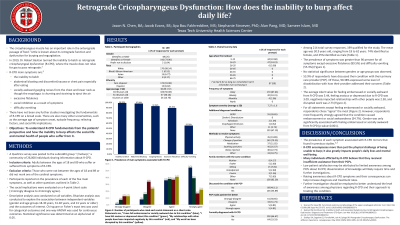Tuesday Poster Session
Category: Esophagus
P3251 - Retrograde Cricopharyngeus Dysfunction: How Does the Inability to Burp Affect Daily Life?
Tuesday, October 24, 2023
10:30 AM - 4:00 PM PT
Location: Exhibit Hall

Has Audio

Jason N. Chen, BA
Texas Tech University Health Sciences Center
Lubbock, TX
Presenting Author(s)
Jason N. Chen, BA, Jacob T. Evans, BS, Stephanie Stroever, PhD, MPH, Alan Pang, MD, Sameer Islam, MD, MBA
Texas Tech University Health Sciences Center, Lubbock, TX
Introduction: Retrograde function and dysfunction of the upper esophageal sphincter is a relatively new condition coined by Dr. Bastian in 2019 to describe the inability of the cricopharyngeal muscle to relax and allow for gas to pass retrograde. The major symptoms are the inability to belch, abdominal bloating nausea, gurgling noises from the chest and lower neck, excessive flatulence, social inhibition, and difficulty vomiting. Few studies have explored the associated symptoms of RCPD on a population scale. The social life implications of the disease are also unknown. The purpose of this study is to characterize RCPD and how the inability to burp affects the social life and mental health of people who suffer from it.
Methods: A Qualtrics survey was posted to the subreddit group “r/noburp,” a community of 25,000 individuals with the purpose of sharing information about RCPD. Interested adults (ages 18-89) who suffer or suffered from symptoms of RCPD were invited to complete the questionnaire. Participants reported on the prevalence of each symptom, as well as the social implications of RCPD on a 4-point Likert scale (1=strongly disagree to 4=strongly agree). Preliminary results from the first week of recruitment were pooled, and descriptive statistics were calculated.
Results: Of the 158 respondents, with a mean age of 30.6 and gender identity of 73%/26% female/male, 98.7% reported the inability to burp, 98.1% reported abdominal bloating and discomfort, 93.7% reported socially awkward gurgling noises, 91.1% reported excessive flatulence, and 55.1% reported difficulty vomiting. Of those, 86.7% of respondents reported having symptoms occur daily. Despite the symptom prevalence, only half of the respondents reported discussion of their RCPD symptoms with their primary care provider (PCP), and 58.8% strongly disagreed and 34.1% disagreed with the statement that their PCP understood how to make them feel better. The average Likert value for feeling embarrassed from RCPD was 3.43, feeling anxious/depressed due to RCPD was 3.02, negatively impacted relationships with other people was 2.61, and disrupted work was 2.72 (Figure 1).
Discussion: RCPD is an unfamiliar disease among healthcare providers, and few patients who suffer from it feel they get adequate help. Beyond disease symptoms, RCPD impedes daily life, affecting patients’ relationships and personal and work lives. By increasing awareness of symptoms and their implications, diagnoses and treatment rates can be increased, improving quality of life.

Disclosures:
Jason N. Chen, BA, Jacob T. Evans, BS, Stephanie Stroever, PhD, MPH, Alan Pang, MD, Sameer Islam, MD, MBA. P3251 - Retrograde Cricopharyngeus Dysfunction: How Does the Inability to Burp Affect Daily Life?, ACG 2023 Annual Scientific Meeting Abstracts. Vancouver, BC, Canada: American College of Gastroenterology.
Texas Tech University Health Sciences Center, Lubbock, TX
Introduction: Retrograde function and dysfunction of the upper esophageal sphincter is a relatively new condition coined by Dr. Bastian in 2019 to describe the inability of the cricopharyngeal muscle to relax and allow for gas to pass retrograde. The major symptoms are the inability to belch, abdominal bloating nausea, gurgling noises from the chest and lower neck, excessive flatulence, social inhibition, and difficulty vomiting. Few studies have explored the associated symptoms of RCPD on a population scale. The social life implications of the disease are also unknown. The purpose of this study is to characterize RCPD and how the inability to burp affects the social life and mental health of people who suffer from it.
Methods: A Qualtrics survey was posted to the subreddit group “r/noburp,” a community of 25,000 individuals with the purpose of sharing information about RCPD. Interested adults (ages 18-89) who suffer or suffered from symptoms of RCPD were invited to complete the questionnaire. Participants reported on the prevalence of each symptom, as well as the social implications of RCPD on a 4-point Likert scale (1=strongly disagree to 4=strongly agree). Preliminary results from the first week of recruitment were pooled, and descriptive statistics were calculated.
Results: Of the 158 respondents, with a mean age of 30.6 and gender identity of 73%/26% female/male, 98.7% reported the inability to burp, 98.1% reported abdominal bloating and discomfort, 93.7% reported socially awkward gurgling noises, 91.1% reported excessive flatulence, and 55.1% reported difficulty vomiting. Of those, 86.7% of respondents reported having symptoms occur daily. Despite the symptom prevalence, only half of the respondents reported discussion of their RCPD symptoms with their primary care provider (PCP), and 58.8% strongly disagreed and 34.1% disagreed with the statement that their PCP understood how to make them feel better. The average Likert value for feeling embarrassed from RCPD was 3.43, feeling anxious/depressed due to RCPD was 3.02, negatively impacted relationships with other people was 2.61, and disrupted work was 2.72 (Figure 1).
Discussion: RCPD is an unfamiliar disease among healthcare providers, and few patients who suffer from it feel they get adequate help. Beyond disease symptoms, RCPD impedes daily life, affecting patients’ relationships and personal and work lives. By increasing awareness of symptoms and their implications, diagnoses and treatment rates can be increased, improving quality of life.

Figure: Figure 1. Number of participants who rated each social statement on a Likert scale. Statements are, “I have felt embarrassed or socially awkward due to this condition” (red), “I have felt anxious or depressed about this condition” (purple), “My relationships with other people have been impacted negatively by this condition” (blue), and “My work has been disrupted by this condition” (green).
Disclosures:
Jason Chen indicated no relevant financial relationships.
Jacob Evans indicated no relevant financial relationships.
Stephanie Stroever indicated no relevant financial relationships.
Alan Pang indicated no relevant financial relationships.
Sameer Islam indicated no relevant financial relationships.
Jason N. Chen, BA, Jacob T. Evans, BS, Stephanie Stroever, PhD, MPH, Alan Pang, MD, Sameer Islam, MD, MBA. P3251 - Retrograde Cricopharyngeus Dysfunction: How Does the Inability to Burp Affect Daily Life?, ACG 2023 Annual Scientific Meeting Abstracts. Vancouver, BC, Canada: American College of Gastroenterology.
